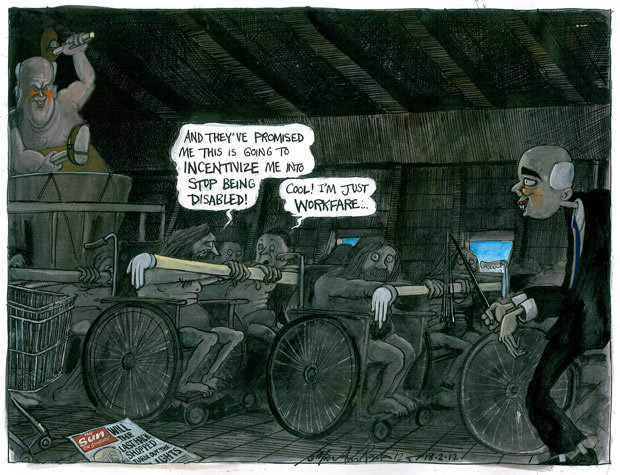
In document 2 the civil servant who gave the presentation answers some of the questions raised. On pg 4, in reference to the question of time limits to the work experience placements, I went back to the DWP to clarify this further. They said that there were no time limits (unlike in other similar schemes). Over the phone with a DWP spokesperson our conversation went something like this:
"So someone could be doing work experience for for ten years?"
"Don't be ridiculous, it would never last that long."
"So then why don't you put a ten year limit on it?"
[Pause]..."We don't have any plans to put a limit on it."
Full article HERE
Over the weekend, after The Guardian posted up their coverage of the DWP's plans to make people with disabilities work an unlimited amount of time, people were stating their disbelief that the government, or the DWP, could ever do such a thing.
In response to this, The Guardian have posted up the main documents used in the DWP's meeting about the issue, and also included the fascinating phone interview with a representative of the DWP regarding the unlimited nature of these placements.
While the documents themselves point out that only those deemed able to go back to work will be "compelled" to take these placements, it is worth noting that the people doing the assessing often have little understanding of the various situations that disabled people are in.
My wife, for instance, was at one time deemed perfectly fine to go back to work because she was not visibly sweating or rocking back & forth during her assessment, thus proving to the assessor that she mustn't be suffering too badly from anxiety. The assessor was not trained in Autistic Spectrum Disorders, and had no understanding of Asperger's Syndrome, meaning that she missed the fact that Lindsey was completely unable to look the assessor in the eye, could barely speak to her, and was having to control her anxiety because she didn't want to appear "weird" infront of her by stimming (rocking back & forth, shaking her hands, wringing her hands, tapping her feet, etc).
Now, once again, please do not think that I am saying that Lindsey will never be able to go back to work or that people should not go through these assessments; all I ask for is that those that do the assessments be trained in understanding the disability they will be assessing. In this case, it would be as simple as asking Lindsey's therapists, psychologist, or CPN, whether they felt that she was fit enough to return to work or even take up a placement.
Reform for the welfare system is a necessity, because we know that people are indeed taking advantage of it, but those that are pushing for reform are taking it in entirely the wrong direction. I'd have thought it was obvious that instead of trying to pin everybody under one benefit claim as a liar, they could simply reform the assessment techniques they use and quickly solve the problem of "fakers" and "cheaters".
No comments:
Post a Comment